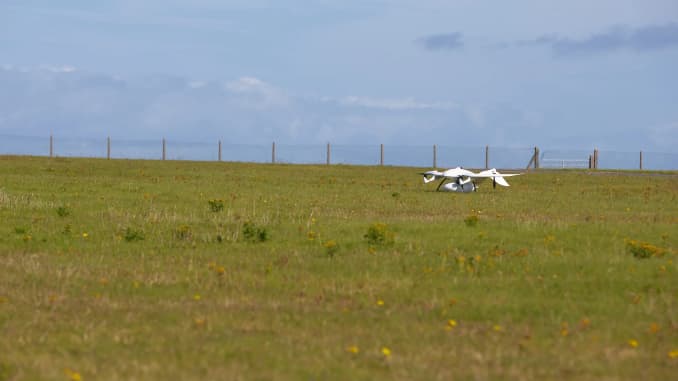
Autonomous drone technology has been used to deliver diabetes medication to a location off the west coast of Ireland.
In an announcement Monday, the National University of Ireland (NUI) in Galway said the drone’s journey between Connemara Airport and Inis Mór, which is part of the Aran Islands, showed “the possibility of future deliveries of this kind within planned drone corridors.”
The contents of the delivery were insulin and glucagon, while the drone also collected a patient’s blood sample. The drone delivery was supported by the Irish Aviation Authority and maintained contact with air space regulators throughout the trip.
NUI Galway led the project and other partners included Vodafone Ireland, which used its internet of things (IOT) network to support the drone’s communications, and Novo Nordisk, which supplied the medication.
The drone used, a Wingcopter 178 Heavy Lift, is an all-electric vehicle that can travel up to 100 kilometers in under an hour. Debbie Power, Vodafone Ireland’s IOT country manager, said the length of the first leg amounted to 21.7 kilometers, while the second leg was 21.6 kilometers.
Power added that the successful internet of things connectivity had enabled the flight, “to adhere to aviation regulatory standards and provides good evidence for further investigation into drone delivery corridor planning, as long range flights, like this one, can be mapped with our radio frequency network input.”
Hyo-sang Shin, from Cranfield University’s Centre for Autonomous and Cyberphysical Systems, told CNBC via email that the “utilization of drones for delivering medical supplies to remote communities” could potentially support the wider transformation of health care.
Indeed, the use of drones for the delivery of medical supplies is becoming increasingly common. U.S. firm Zipline, for example, says it has been using drones to deliver items, including vaccines and blood, in Rwanda since 2016. In 2019 it began deliveries in Ghana.
In December 2018, Unicef announced that a baby on an island in the South Pacific country of Vanuatu had become the “world’s first child” to be administered a vaccine delivered commercially via drone.
The drone crossed nearly 40 kilometers of mountainous terrain to reach its final destination of Cook’s Bay, Unicef added. In all, 13 children and five pregnant women were given vaccines.
At the time Unicef’s executive director, Henrietta H. Fore, described the flight as “a big leap for global health.”
“With the world still struggling to immunize the hardest to reach children, drone technologies can be a game changer for bridging that last mile to reach every child,” she added.
Written by: Anmar Frangoul